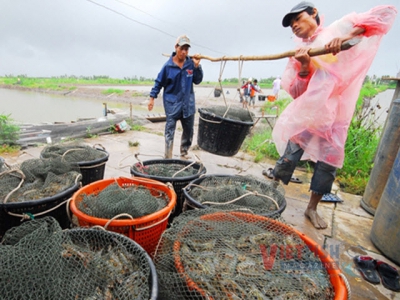Shrimp sector in the race of bringing in 3.5 billion USD

Even though the shrimp export sector stood by in the first quarter of 2020 following the coronavirus outbreak, it may see an increase in the next few months. The goal of bringing in 3.45-3.5 billion USD this year is difficult but possible to achieve.
Regardless of Covid-19, shrimp exports is forecasted to increase
General Director of the Directorate of Fisheries Trần Đình Luân said that Vietnam’s shrimp sector is forecasted to face the continuing challenges in 2020 amid the unpredictable US-China trade tension, huge impact of the covid-19 into trade activities and living, and devastating salt intrusion and drought in the Mekong Delta provinces.
Remarkably, the world is leaning towards domestic trade protection which might negatively affect Vietnam’s shrimp productions and consumption.
Moreover, an increase in prices of material, imported shrimp material, feed, medicine, chemical substances, environmental treatment products, fuel, and machines used in shrimp farming will create an enormous impact into the domestic shrimp cultivation.
The coronavirus outbreak has been affecting the living and trade activities, resulting in a slump in demand in the first half of the year.
However, the Vietnam Association of Seafood and Exporters and Producers (VASEP) forecasts the shrimp exports to increase in 2020 regardless of the pending unsold stocks of 2019, consumption to rise and export prices to recover.
Analyzing the opportunities in the next few months, VASEP predicts shrimp exports to the EU will rise when benefiting the preferential tariff from the FTA, which helps Vietnamese shrimps compete against India, Thailand and Indonesia. These three markets may not target the EU market when their output is forecasted not to rise this year. However, the EU’s demand for imports has not increased in recent years, VASEP thinks that shrimp exports to this market will rise by maximum 15% to reach 800 million USD in 2020.
The US’s shrimp imports will remain high. India continues to take some market shares from Thailand in 2019 and the previous years. India and Indonesia are still the biggest competitors of Vietnam in the US market in 2020. The big challenges faced by these two markets when entering the EU and the coronavirus outbreak in China have triggered them to increase their sales in the US. With the brightest scenario where the final result of POR 14 is as good as POR13, Vietnam’s shrimp exports to the US is forecasted to increase by 7% to reach 700 million USD in 2020.
The sales of Vietnamese shrimps in the Japanese market will be just as the same as 2019, valued at 618-620 million USD.
Reduce production cost to increase competitiveness
According to VASEP, shrimp exports to the Chinese market got stagnant in the first quarter of 2020, but will sharply increase from quarter II, thus it is forecasted to grow by 10% in 2020 with an export volume of 600 million USD.
China will be the biggest destination of Vietnamese shrimps in the long run. Companies are advised to update China’s requirements and regulations to adjust production and maintain exports to this market.
The Directorate of Fisheries recommends the Government to adopt a measure to support companies and farmers in a value chain so as to optimize the production chain and reduce the production cost in the face of challenges and possible opportunities.
General Director Luân requires shrimp farmers and companies to enhance the quality, reduce the production by curtailing intermediate stages, and follow such schemes as VietGAP, GlobalGAP and ASC to upgrade the products. Moreover, trade promotion must be enhanced in either domestic consumption or penetration into new markets.
The shrimp sector must stay out of using prohibited substances, drugs, and chemical substances in cultivation, and improve the quality and traceability.
Related news
 Long An breeds brackish-water shrimp
Long An breeds brackish-water shrimp The Cửu Long (Mekong) Delta province of Long An plans to invest more than VNĐ1.24 trillion (US$53 million) to develop brackish water shrimp cultivation
 Seafood exports to drop 5 percent in Q2
Seafood exports to drop 5 percent in Q2 Vietnam’s seafood exports will continue to see reductions in next few months due to the pandemic, with a slight year-on-year decrease of 5 percent to 2 billion
 Bến Tre encourages to convert salt pens to shrimp farms
Bến Tre encourages to convert salt pens to shrimp farms Overwhelming situation and dreadful weather has been affecting salt production, resulting in many salt farmers converting salt pens to shrimp farms.